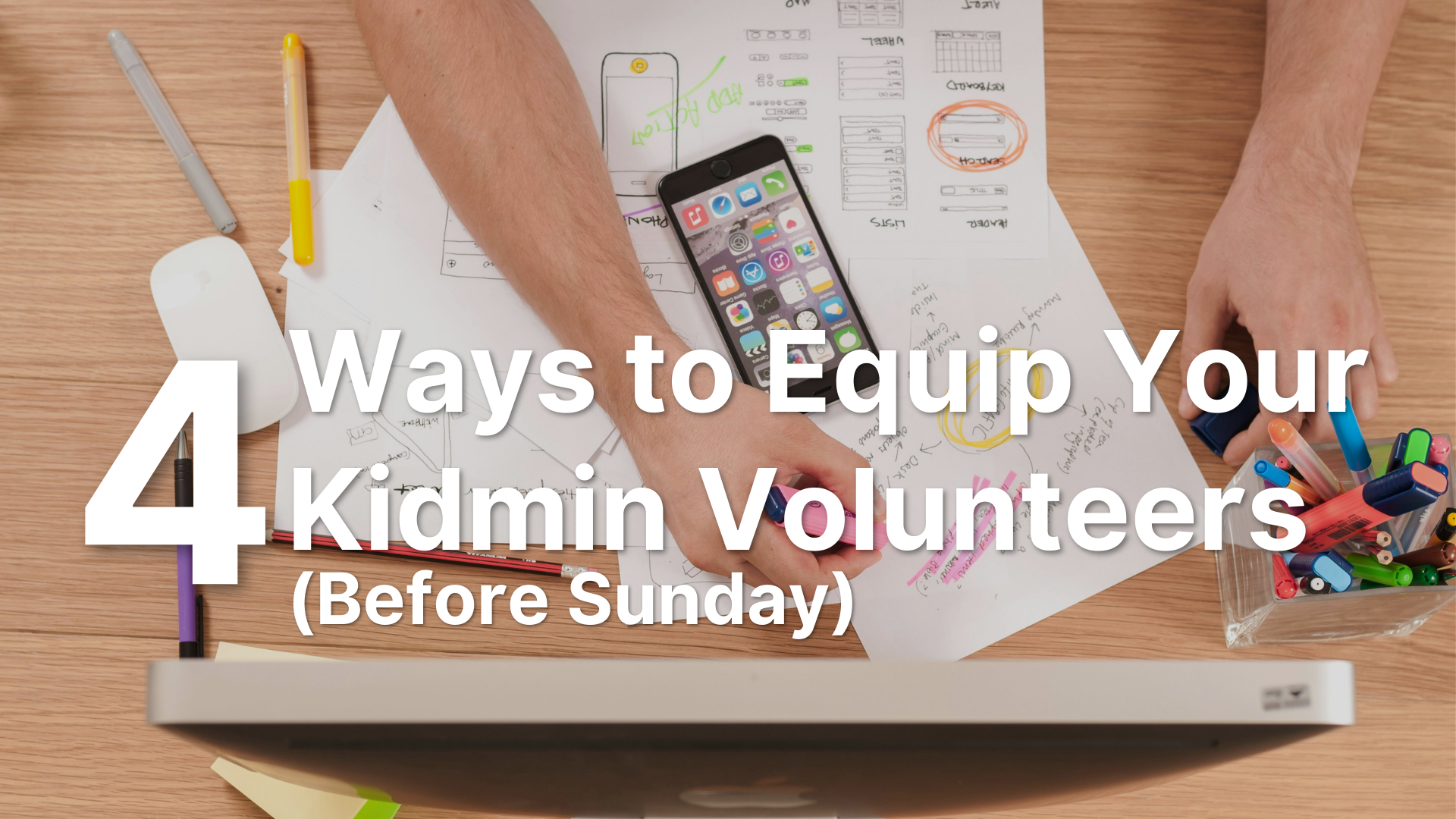4 Ways to Equip Your Kidmin Volunteers (Before Sunday)
Photo by Firmbee.com on Unsplash
Picture this. You’ve been working hard to get ready for Sunday morning. You laid out the crafts. You loaded the slides. You queued up the songs. You’re excited for what lies ahead and the change that’s going to happen in kids’ lives. But then you realize that you’re not alone. In fact, your volunteers are leading worship, games, and small groups. You can’t be in two places at once and do it yourself. So how are you supposed to equip your volunteers so they can be prepared before Sunday?
I’ve been there. I was that kids pastor. As soon as my volunteers arrived, I’d hurriedly hand them the lesson as I frantically moved to the next task. It wasn’t a great strategy and didn’t set my volunteers up for success. Thankfully, after trying a lot of different things, I’ve learned. Unfortunately, there is no silver bullet. But there are some best practices. Here are a four.
1. Print Physical Copies
I’ve been on a crusade for years to eliminate paper from my life. It takes up too much space, it’s hard to search, and can get messed up easily. Almost everything I do is on a digital device. But sometimes you can’t beat dead trees. Digital isn’t perfect either. The Wi-fi can go out, you forget your password, the device isn’t charged, it locks up, or you lose your place.
These obstacles can all be overcome and for the most part I have. But I can’t expect every volunteer to be as prepared or able to troubleshoot as well as I can. So, the best thing to do is to print the lesson.
Every week, I print the sermon, small group materials, service order, and activity pages. And I don’t print just one copy. I print enough for every volunteer serving that day. In a perfect world, the volunteers would come in with their materials in hand, prepared for the day. But we don’t live in a perfect world. So, it’s best to be prepared.
By the way. If you do have a volunteer that comes in that prepared, praise them and do everything you can to hold on to them. They’re one of the good ones.
2. Send an Email
Having printed copies is all well and good, but if we want our volunteers to have the materials beforehand, we need to give it to them...beforehand. For years, my main method of communication has been email.
Every Thursday, I’d create an email and attach all the documents needed for that Sunday. Then I’d send it to the team. This email could get very large, and sometimes, I'd forget to send it. My volunteers relied on this email to know it was their week to serve and to know what they were doing.
I still love this method, but it’s manual. I have to remember to do it and working ahead is nearly impossible. I still haven't figured out how to reliably schedule an email in Gmail or Outlook, which is why I switched to number 3.
3. Automate with Planning Center Services
Starting to use Planning Center (PCO) was an epoch for me. I was struggling to plan, communicate, and streamline my ministry. I created a ton of self-made tools to get it done. Then I led the charge to adopt a new church management system and learned just how great PCO could be.
Planning Center Services is great. You can plan weeks or months out, assign volunteers, and automate reminder emails. I like to plan 4-6 weeks ahead depending on the upcoming series. At the end of the current series, I’ll plan what's next. In one day I'll assign all my volunteers to their jobs and attach all the documents needed for that service. Once all the plans are in place, I’ll send one mass email to my volunteers.
Here's where PCO shines. After that email, I’m done. Planning Center Services automatically reminds my volunteers on Thursday and Saturday before they serve. If they don’t want email, they can sign up for text messages or get push notifications from the Services app. Once they access their service, they can see the service order and any other materials they’ll need. It’s made my life so much easier. You can see how I set all this up here.
4. Share in The Cloud
Whether you use Google Drive, Dropbox, One Drive, or some other cloud service, they’re all about the same. While I do use these to provide my materials to my volunteers, it’s not my primary tool.
By doing the things I've outlined above, you are taking an action the volunteer now has to respond to. If you just upload the files to the cloud, all the initiative is on them. They have to remember to look, find the link, find the right materials, and finally, download them. Again, if we lived in a perfect world…
Because the drive is passive, I only share a link with my top-level volunteers. For instance, when I was a multi-site kids pastor, my elementary coordinators were the only ones with access. We used the folders for two purposes.
Every month before I planned out the new series, we’d look at the curriculum and decide what to use and what to change.
Once I had everything planned out, they could access the materials they needed for that week.
At my current church, I’m planning all the services and putting the materials in a shared Google Drive. The two volunteers who run kidmin every week are the only ones who have access. They have full editing capabilities and can see the whole month mapped out. At the beginning of the month, I take all those materials and upload them to Planning Center Services. I assign them to the week they’ll be used and let the program do the rest. Finally, after printing the necessary materials, I place them in a central location. Then my lead volunteers will share them with the rest of the team.
There is no one perfect method. But by using these tools, my volunteers have everything they need to be successful. And a prepared volunteer is a happy volunteer.










If you want to know what’s working in your ministry or not, then you need to get your parents’ opinion. This kit gives you all the tools you need to find it.